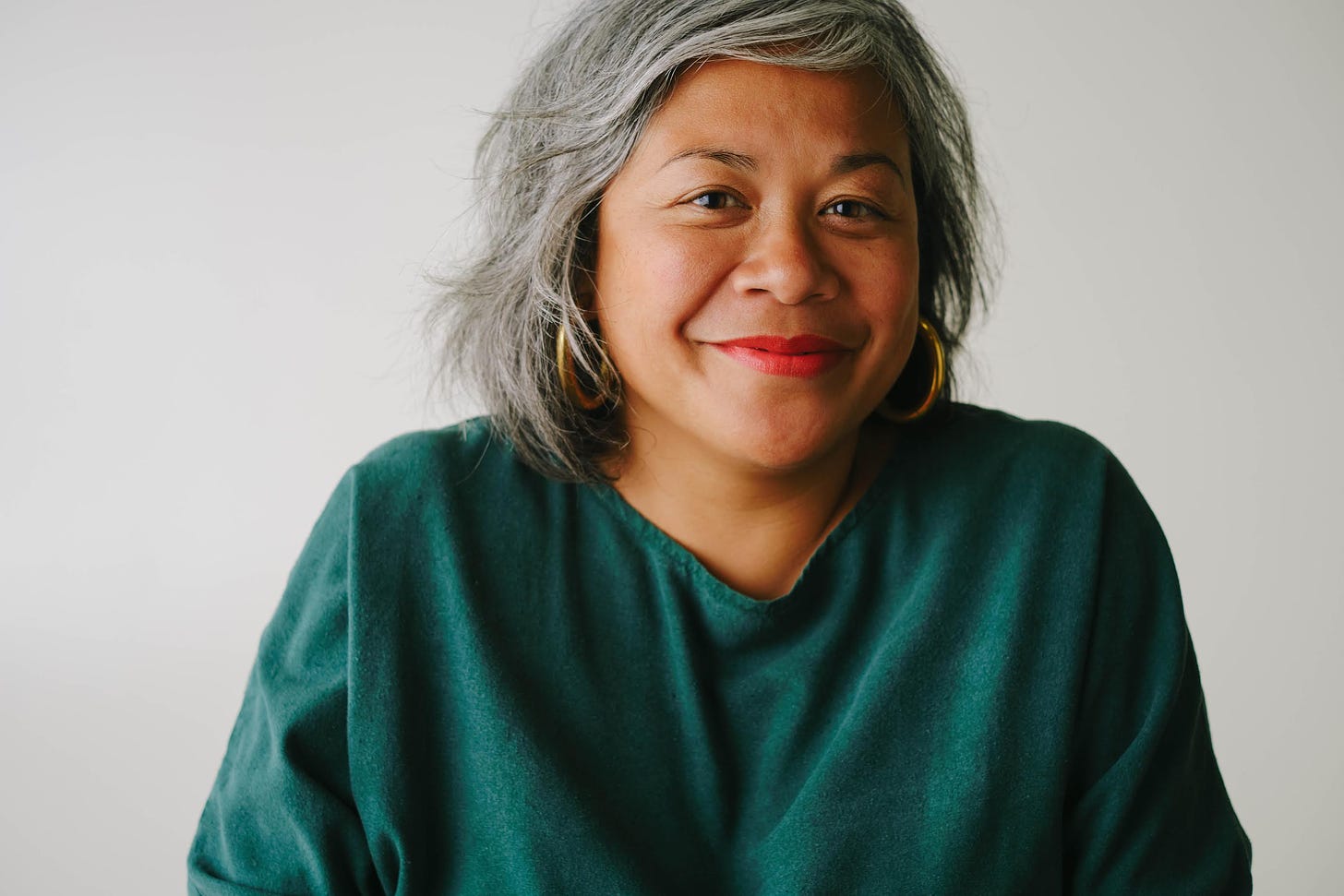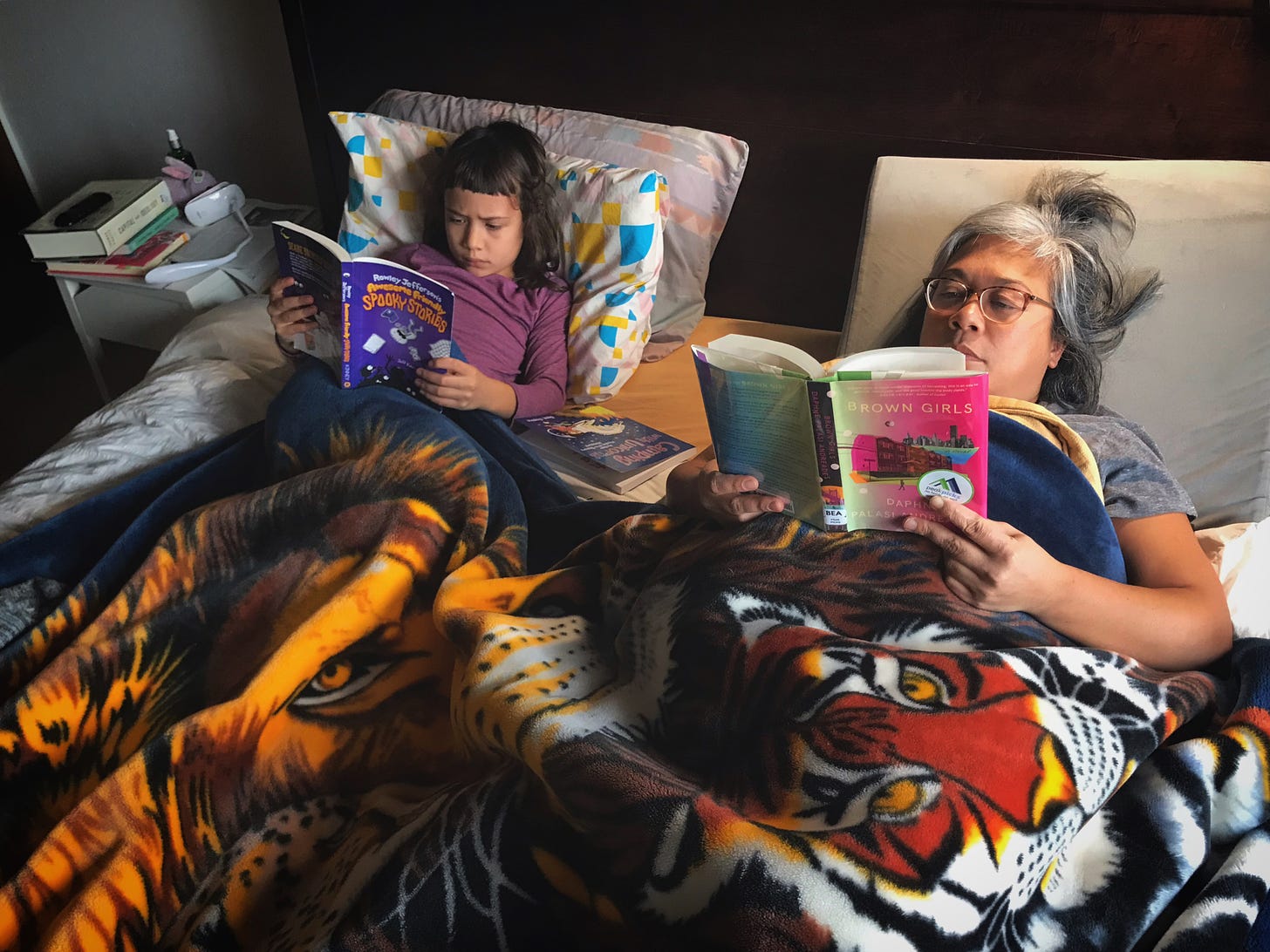'Matrilineal feast of my dreams'
5 questions for writer, momma, and pleasure-seeking missile Angela Garbes
“If we were to think about work in terms of our humanity—making people feel dignified, valued, and whole—then caregiving is the most important work we can do with our time on earth.”
So begins Angela Garbes’ wide-ranging, gorgeous new exploration of motherhood as essential, but also liberating, labor. It’s called Essential Labor: Mothering as Social Change and it’s out next week.
What I love so much about this book, unlike so many that have to do with parenting, is that it validated so many of the small, seemingly mundane choices I make every single day to prioritize love over money, to seek joy, take care of myself and my community, to fall in love with my friends and neighbors, to revel physically in my children, to build my identity around so many things beyond formal work etc.
For some, this book may be a wake-up call. For others, it may be deeply validating. For all, it’s a holistic take on what it means to mother (which she defines beyond gender) and why that has such profound meaning for our lives and our legacies on this planet.
Meet visionary, funny, grounded Angela…
Courtney Martin: In the intro, you write about how conflicted you felt at losing your work and creative time during covid. It made me wonder: when/how did you get this book written?
Angela Garbes: It was (and this is an understatement) really fucking hard. I wrote this book in a little under eight months; to do that I had to reimagine my entire creative process. I'm a double Virgo (read: perfectionist) who typically line edits as I type (like, it might take me an hour to write a short paragraph) but I simply didn't have the luxury of time with this project, both in terms of deadline and minutes each day (during the period I was writing, my older daughter was in virtual, then in-person, kindergarten, and then on summer break.) My mantra was "embrace urgency and imperfection." During the summer I woke up at 5:30 am (while my family was still asleep) and just wrote--didn't worry about structure, what chapters things might go in, just generated words and scenes and ideas that I wanted to explore. I did Jami Attenberg’s 1000 Words of Summer then kept going, writing 1000ish words every day for at least a month. It was about getting drafts down because a draft (even a really shitty one) was something I could work with, much more valuable than even the best ideas that only lived in my head. So process-wise, it went like this: vomit words, sort, revise, repeat. But that's only half of it.
Practically speaking, I couldn’t have done this without my spouse Will who, immediately after I signed my contract, forced me to sit down so we could go through our google calendars together. I need solitude and time to write, which he understands better than anyone. He proposed/declared that every three weeks I would go away for a minimum of four days--sometimes a full week--to write. That day, we blocked off chunks of time on our shared calendar for the next six months. I went to borrowed and rented spaces--cabins, hotels, empty houses, any place away from our house in Seattle. I ate ramen, microwavable cheese steaks, frozen dinners, drank coffee all day, ate pasta for breakfast, barely bathed, had no obligations to anyone or anything other than writing. Will took care of everything on the domestic front, with help from my parents and friends. My daughters were as patient and understanding as they could be about Mama disappearing on the regular.
Honestly the whole process nearly broke me, but I’m beyond proud of writing a book during the pandemic while taking care of myself and my mental health, my husband, and two kids under eight.
There were times, while I was reading, where I lost track of the fact that I was reading a book on mothering. I believe that’s because you were exploding the boundaries of what we think of as “parenting literature.” Was that your intent? Can you say more about how you decided what was in or outside the realm of this exploration?
Classifying books by genre and subject isn’t something authors have always done--it’s the result of the publishing industry which has commodified writing and books. The term (and perceived limits of) “parenting literature” don't mean much to me, a person who believes that mothering is relevant to every single person on earth (hi, we were all born, were all cared for through helplessness, and guided into consciousness by others). My intent is always to write the essays, articles, and books that I need--that I want and deserve, and that don't necessarily exist yet. I consider my writing, in part, as service, but it's also quite selfish!
In terms of how I decided what went into this book, I’ll say that nearly everything about my mothering is directly influenced by my daughtering. So first I sought to better understand my mother (and my father), who immigrated to the United States from the Philippines, the forces that shaped their lives and how they mothered and parented me. My mother is an incredible person--strong and caring, hilarious, loyal and kind. She and my father bathed me in unconditional love and everything good about my life is a result of their care. We are very different people, though, and haven’t had the easiest relationship, the result of our personalities as much as the different countries we were each raised in. Filipinx culture is dominated by a lot of silence that benefits institutions rather than people (American culture too, hello), so I suppose wanted to write my way through that silence, or at least the particular silences--about bodies, appetities, emotions, sex, pleasure, community--that I wished had been filled with stories, debate, and conversation, and which I plan to continue filling with my daughters (and hopefully my parents!).
This book is so often about the pleasure of mothering, the embodied beauty of it, the surprises and opportunities for generational change. It was less often about the “problems of parenting”—the lack of structural support, the monotony, the exhaustion. Let’s call it “pleasure forward.” Who were your influences on that kind of approach? I’m guessing there are plenty as you quote so often and generously in the book.
Pleasure forward, yesssssss. That’s me. For years my husband has jokingly called me a pleasure-seeking missile. I love cooking (and always tasting as I go), eating, parties, dancing, high kicks, sweating, belting karaoke and accidentally staining the microphone with my lipstick (pre-covid obvs), getting scrubbed at the Korean spa, saunas and hot tubs, martinis, drugs (this is truer of younger Angela, I am now middle-aged and currently experimenting with sobriety), jumping in lakes and oceans, soft blankets, thick yogurt and fudgy cheeses, spicy and sour soups, meat on the bone, massage, lying on a beach for hours, sleeping, and touching. The world is burning, I feel that acutely, and I am fighting for the world I want--a world with universal health care, paid leave, a universal basic income, full body autonomy, among other things--but I am absolutely going to get my life and take as much pleasure in all of it as I can. This book is indeed a celebration of the physical pleasures of mothering--the animal closeness, silliness, movement, as well as the unselfconsciousness and feelings of true utility it can bring to our bodies.
As far as influences: my friend Shruti Swamy is the most talented, sensual, and pleasure-oriented writer I know; I love the unapologetic but always thoughtful consumption of Alicia Kennedy; I'll read everything Carvell Wallace writes, always and forever, because no one else makes me feel the urgency of pursuing love and freedom. I can't recommend learning about disability, accessibility, and disability justice enough--reading Sunaura Taylor, Leah Lakshmi Piepzna-Samarasinha, and Sara Hendren fully changed the way I look at the world and human bodies. And I owe just as much to dance artists at my beloved Dance Church--especially Kate Wallich, Tariq Mitri, Lavinia Vago, and Alethea Alexander--who have helped me more fully inhabit my body, mind, and access physical pleasure.
I’m interested in how some mothers, especially White and/or privileged, abuse the trope of the “mama bear” to actually resist social progress. I'm thinking of the massive resistance to school desegregation historically, but also progressive moms who navigate away from neighborhood public schools in the name of getting "the best" for their kids today. Thoughts?
Your use of quotes speaks volumes. It all depends on how you define what “the best,” right? To me, the best is always what benefits the most people, especially those who need the most support. It’s not complicated. I don’t have a lot of patience for all the hand wringing, agonizing, justification, and rationalizing--and definitely not the performance of those things. I explained it to my kid like this: “If public school is good enough for Azmira, it’s good enough for you.” (Azmira is a girl a few years older than us who used to live next door.) We’d be living in a better world if people invested as much time and energy (and money) into the tremendous public resources we already have rather than weaponizing them by putting them into private spaces that exclude so many.
You get to have a dinner party with five of your favorite mothers, alive or dead. Who do you choose, what do you serve, and what song does the dance party afterward get sparked off by?
This one’s easy. I’d throw the celebratory matrilineal feast of my dreams. Guests of honor would be my mom Josefina Garbes; my maternal grandmother Lily Zaragoza; my maternal great-grandmother Mercedes Villanueva; my paternal grandmother Eurfrecina Garbes; and my mother-in-law Joanne Pittz (who died years before I ever met my husband). I want to know the mothers from whom I came, feed and take care of them, even if for one night. We'd have brandy Manhattans with maraschino cherries (Joanne's favorite). I'd make them salmon sinigang, so they could taste the Pacific Northwest where I live, but that's the only thing I’d cook. The rest would be dim sum and Chinese takeout: shumai, turnip cakes, taro-wrapped sticky rice, green onion pancakes, salty fish and chicken fried rice, salt-and-pepper squid, hand-shaved noodles with pork, and roasted duck. The dance party is set off by “Bebot” by the Black Eyed Peas--the chorus involves chanting “Filipino! Filipino!,” which my daughters would lead....because of course children would be welcome at our table too.
We will collectively donate to the Tubman Center for Health and Freedom, in honor of Angela. It is “a community organization committed to the principles of healing and people’s liberation from systems that make us unwell.” YES PLEASE.








The media gives us such vital articles to inspire tomorrow’s Mother’s Day. First, there’s Courtney’s latest interview that makes me shout out “Yay, Angela!” And then read all of the books she mentioned. Then there are two Op Ed pieces in today’s Saturday NY Times by Stephanie Foo and Alison Block that present blazing insights into the complexity of motherhood and the immense responsibility of caring for women and children. I’m honestly overwhelmed by Dr. Block’s courage as an abortion provider. Thanks to all for these gifts of thoughtful meditation on the many meanings that this special Day may carry. DD
What an interview! Her perspective on parenting as a privileged person was a lightning bolt: “If public school is good enough for Azmira, it’s good enough for you.” Hell yeah!
Need to get my hands on both of her books!